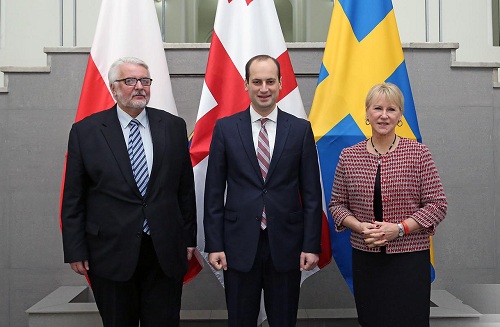| Before the Eastern Partnership Summit |
| Civil Georgia, Tbilisi / 14 Nov.'17 / 11:58 Witold Waszczykowski, Margot Wallström |

Polish, Georgian and Swedish Foreign Ministers in Tbilisi, November 14, 2017. Photo: MFA Georgia
Joint article on the Eastern Partnership by Mr. Witold Waszczykowski, Minister of Foreign Affairs of the Republic of Poland and Ms. Margot Wallström, Minister of Foreign Affairs of the Kingdom of Sweden.
Eight years ago the EU’s Eastern Partnership (EaP) was launched. It was a joint initiative of Poland and Sweden, and it meant that the EU deepened its relations with six of its closest neighbours, the home of 75 million people: Armenia, Azerbaijan, Belarus, Georgia, Moldova and Ukraine.
The EaP has been one of the most successful foreign policy initiatives of the EU. Over these eight years, the EU has signed Association Agreements and Deep and Comprehensive Free Trade Agreements with Georgia, Moldova and Ukraine. And more, for instance: Since 2009 the European Union provided 1.5 billion euro for the development of companies across the region. Last year more than 4000 students from the region received scholarships in the EU, and almost 10 000 young people took part in exchange programmes. Citizens of Georgia, Moldova and Ukraine now travel without a visa to Schengen countries. A majority of people in the region (61%) believe that developing stronger relations with the EU is a good thing. More than 70% of people in the region view the EU as a bearer of core values such as human rights, democracy and rule of law, civil liberties and economic prosperity, peace, stability and security.
Despite past successes, the EaP needs a revival to be relevant also for the future. On November 24th, European leaders will meet for the EaP Summit in Brussels. We now want to propose a way ahead for the development of the EaP. It needs to be more focused on the needs of people, in particular young people, and create more concrete results in the four following areas:
- Ownership. We believe that all countries which are engaged in the EaP policies should be mutually responsible for carrying out its goals and priorities. Those who declare higher ambitions should also deliver on the reforms they have committed to. Georgia is a good example;
- Resilience. The policy dialogue between the EU and the Partner countries should focus on things that make our societies stronger. This means strengthening democratic institutions, supporting human rights and fundamental freedoms, fighting corruption, increasing transparency, making bureaucracy more efficient and increasing equality between men and women. It also means a focus on environmental issues and meeting the challenges posed by climate change;
- Public engagement. There is a link between building more resilient societies and the level of trust of people in institutions: none can be achieved without the other. The EaP must make sense to people, and we must make sure that any reforms can be felt by ordinary people. Young people are particularly important here, and we have asked the European Commission for a youth package to be prepared for the Summit;
- Connectivity. We should give priority to all measures that bring people closer. This could be visa-free travel, exchange programmes to roads, railroads, broadband internet and lower roaming tariffs. The EU has already decided to extend its connection grids to EaP countries. That will be beneficial not only for trade but also for building stronger ties between people in our countries. Since infrastructure is costly we need to combine grants and loans from European and other international financial institutions.
While the EaP does not deal with hard security it can be instrumental in building stability and resilience. It can also be a platform for cooperation among regional partners. Next year both Poland and Sweden will be represented at the UN Security Council as non-permanent members. We want to use this opportunity to promote conflict resolution and crisis management, especially in the EaP region.
Poland and Sweden remain committed to the EaP. And, as Sweden and Poland have always emphasised, the door should be kept open for potential membership for those countries which truly transform. We take responsibility for this relationship and are convinced that building stronger relations between the EU and its Eastern Partners will lead to better lives for the people in our countries.
